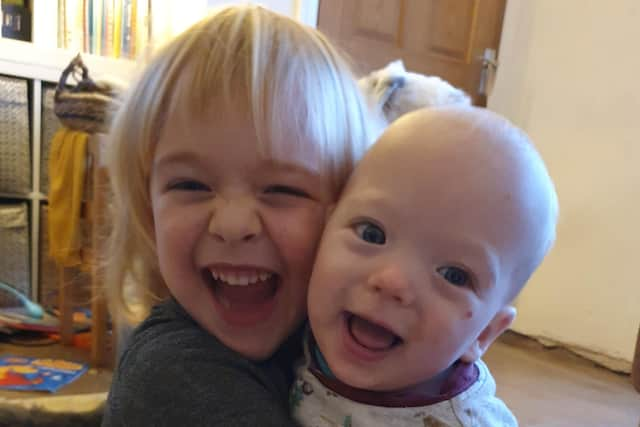Successful trial helping reduce winter virus hospital admissions – High Peak babies play key part
and live on Freeview channel 276
60 of these babies came through volunteer families with Stepping Hill Hospital, supported by Stockport NHS Foundation Trust’s Research and Innovation department, and 27 through Tameside General Hospital, through the Tameside and Glossop Integrated Care NHS Foundation Trust Research and Innovation department.
RSV (Respiratory Syncytial Virus) is one of the leading causes of hospitalisation in all infants worldwide and affects 90% of children before the age of two.
Advertisement
Hide AdAdvertisement
Hide AdIt is estimated that among children in the UK, RSV accounts for around 450,000 GP consultations, 29,000 hospitalisations and 20 to 30 deaths per year, the majority occurring in babies.


RSV often causes only mild illnesses, such as a cold. However, for some babies, it leads to more severe lung problems such as bronchiolitis and pneumonia.
Now, the HARMONIE study has shown an 83% reduction of hospitalisations for RSV in infants who had an injection of the antibody nirsevimab. A single dose also reduced hospitalisations due to severe chest infections caused by RSV by 76%, and decreased hospitalisation for all chest infections by 58%.
The findings of the study, which opened in the North West and across the UK last winter, have been published in a paper in The New England Journal of Medicine.
Advertisement
Hide AdThe new treatment is approved in the UK and is being considered for a national RSV immunisation programme. Data from the trial has already been used to roll out the jab in the US and Spain this winter.
Advertisement
Hide AdMore than 8,000 infants in the UK and Europe took part, and families in the North West played a big part in this effort.
A total of 502 babies, aged newborn to 12-months-old, participated in the study at hospitals, as well as some GP practices, across the region after their parents or guardians consented to be part of the research.
Health and care professionals across the region also played a huge role. The HARMONIE study is a collaboration between Sanofi, its partner AstraZeneca, and the National Institute for Health and Care Research (NIHR), which supported the delivery of the study across 16 sites in Greater Manchester, Merseyside, Cheshire and Lancashire.
Advertisement
Hide AdFrancesca Ribenfors, of New Mills, was one who agreed to her son Sammy being part of the HARMONIE trial.
Sammy participated in the trial at Tameside General Hospital, part of Tameside and Glossop Integrated Care NHS Foundation Trust. He was also randomised to receive an injection of the nirsevimab antibody. Francesca said: “Having a premature baby in winter alongside a son in nursery made us acutely aware of the many viruses floating around and how easy it is to pick them up. And so we jumped at the opportunity to take part in the HARMONIE study, not only to help our child but others like him who may be more susceptible. I am so pleased we had the opportunity to contribute to it and hopefully pave the way for other children to receive the vaccination and avoid unnecessary hospital stays.”
Advertisement
Hide AdLiz said: “It's been amazing to hear the news of these results which are so promising. It made me feel proud that we've helped future babies to be protected against this horrible virus and I'll definitely tell Ivy about it when she is older.”
Professor Clare Murray is a Consultant in Respiratory Paediatrics at Royal Manchester Children's Hospital (RMCH), part of Manchester University NHS Foundation Trust.
Advertisement
Hide AdProf Murray is also the Specialty Lead for children’s research at NIHR Clinical Research Network Greater Manchester, and Principal Investigator for the HARMONIE study at RMCH.
She said: “We are proud to have collaborated with research teams across the region to deliver the HARMONIE study and provide opportunities for hundreds of babies to be part of this vital research. It is through their involvement that the study has been able to gather such positive results which reinforce the public health benefit of nirsevimab as an antibody which can help reduce the strain caused to the NHS by RSV every winter and protect babies globally. This is really important evidence with the potential to inform changes in the UK’s immunisation programme for RSV.”